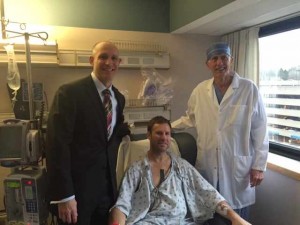-
Heart Surgery Puts ISU Coach Back in the Game
Iowa State University head men's basketball coach Fred Hoiberg says he's feeling surprisingly well five days after open heart surgery.

The 42-year-old Hoiberg underwent the replacement of his aortic valve April 17th at Mayo Clinic's campus in Rochester, Minn. He is expected to be released from the hospital tomorrow.
“This was a second open heart surgery for Mr. Hoiberg, so it was a long operation, but because he is in such good shape and healthy, he is recovering quickly,” says Dr. Rakesh Suri, the Mayo Clinic cardiovascular surgeon who performed Hoiberg’s surgery. “He will do well, and his prognosis is for a normal life.”

The surgery was not unexpected. In 2005 an aortic root aneurysm was discovered during a physical examination. He had surgery to repair the aneurysm at Mayo Clinic that same year, but it was predicted at the time that heart valve replacement was likely in his future. His heart has been closely monitored ever since. Hoiberg says it was a relief to finally have the procedure taken care of.
Hoiberg's fan support is strong, after playing as a star athlete at Iowa State University in the early 1990's, then enjoying a decade-long NBA career, which included time with the Indiana Pacers, the Chicago Bulls and the Minnesota Timberwolves. He has been head men's basketball coach at ISU since 2010. He says wishes for a speedy recovery have come from all over the world and are very much appreciated.
MEDIA CONTACT: Traci Klein, Mayo Clinic Public Affairs, 507-284-5005, email: newsbureau@mayo.edu
Journalists: Broadcast quality video and b-roll are available in the downloads. Click here to read a transcript of Fred Hoiberg's comments.







